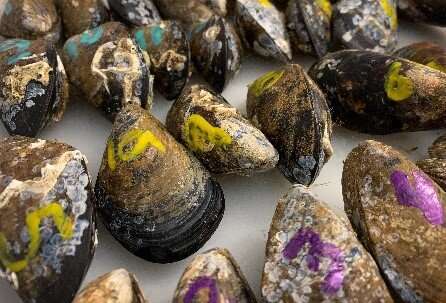Studies find that higher temperatures have an adverse effect on mussels

A recent study provides new insights into the effects of rising temperatures on bivalves, a class which includes mussels and oysters. The findings show further evidence of the detrimental impact climate change could have on fisheries and aquaculture worldwide.
Mussels exposed to high temperatures can suffer from tissue degradation and increased mortality (Clements et al., 2018), but a complete understanding of the mechanisms behind these effects were unclear. New research led by marine biologists at the Norwegian University of Science and Technology and funded through the EU ASSEMBLE Plus project's Transnational Access program investigated how this occurs.
Head researcher for the project, Jeff Clements, said "European mussels are of great economic importance, making up about a quarter of global mussel aquaculture production. While it is clear that these fragile species are adversely affected by temperature changes, we understand very little about how these effects take place."
The research team, comprised of Clements and Fredrik from the Norwegian University of Science and Technology, and Kirti Ramesh, Jacob Nysveen, and Sam Dupont from the University of Gothenburg, investigated "valve gaping behavior" in mussels, an important activity which allows the organisms to eat, respond to their environment, and deter predators.
"Bivalves are particularly interesting as they have no head and therefore have no centralized nervous system," said Dr. Clements. "Despite not having a brain, these animals exhibit complex decision-making behaviors. Understanding these behaviors can give unique insights into wide-ranging effects of climate change."
Over a period of three months, the research team exposed blue mussels to high temperatures and acidic conditions at the Kristineberg Centre for Marine Research and Innovation in Sweden. After this time, the researchers exposed the bivalves to a simulated predator attack. The researchers recorded the time that it took each bivalve to re-open their shells after they had closed to avoid the predator "attack."
The team found that pH had no effect on the mussels' behavior. In contrast, high temperatures had a significant effect on behavior: mussels that had been exposed to three months of higher temperatures stayed closed for twice as long as bivalves kept in a lower temperature environment, meaning that they had extended periods of time when they were unable to feed. The researchers believe this increased time spent closed under high temperatures could help to explain why mussels suffer from tissue degradation and increased mortality when temperatures are high for extended periods of time.
The findings, published in Animal Behavior, have important implications for how fisheries and aquaculture farms respond to the changing climate. With rising ocean temperatures leading to multiple stresses for aquaculture species, shellfish farmers and industry leaders may need to find new methods to maintain productivity and care for their stock.
More information: Animal size and sea water temperature, but not pH, influence a repeatable startle response behaviour in a wide-ranging marine mollusc. Animal Behaviour. DOI: 10.1016/j.anmehav.2020.12.008.
Journal information: Animal Behavior , Animal Behaviour
Provided by AquaTT




















